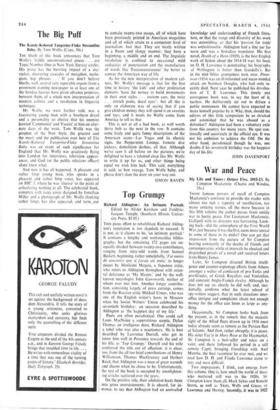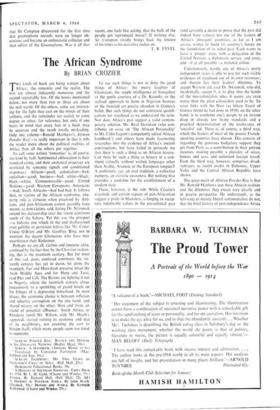War and Peace
THOSE famous powers of recall of Compton Mackenzie's continue to provide the reader with almost too rich a tapestry of recollection, too many enticing names, all the more because in this fifth volume the author passes from untidy war to hectic peace. For Lieutenant Mackenzie, Gallipoli with its disasters was harrowing. Look- ing back—did the atmosphere of the First World War, just because it was the first, seem more unreal to some of those in its midst? One can get that impression from the picture of Sir Compton hearing constantly of the deaths of friends and contemporaries, while at intervals he checked and dispatched proofs of a novel and received letters from Henry James.
Later, Sir Compton directed British intelli- gence and counter-espionage efforts from Athens amongst a welter of confusion of pro-Turks and pro-Greeks, of Greek Royalists and Venizelists and constant Anglo-French rivalry. Although he does not say so, clearly he did well, and, inci- dentally, confirms what the latest school of spy-writers suggest, that in such situations inter- office intrigue and complaints about not enough money for the office can loom as large as any- thing.
Occasionally, Sir Compton looks back from the present, as in the remark that the majestic sight of the Allied fleets drawn up in 1916 must today already seem as remote as the Persian fleet at Salamis. And then, rather abruptly, it is peace. His sister Fay is in Mary Rose at the Haymarket, Sir Compton is a best-seller and takes on a valet, and there followed his period in a still remote Capri, bringing friendship with Axel Munthe, the best raconteur he ever met, and we read how D. H. and Frieda Lawrence came to stay and were difficult.
Two impressions, I think, can emerge from this volume. One is, how small the world of those who mattered still was in the 1920s. Sir Cbmpton knew them all, Mark Sykes and Ronald Storrs, as well as Yeats, Wells and Gosse, or Lawrence and Huxley. Secondly, it was in 1922
that Sir Compton discovered for the first time that gramophone records were no longer ob- noxious and became an enthusiastic collector and then editor of the Gramophone. Was it all that
recent, one feels like asking, that the bulk of the people got reproduced music? If nothing else, Sir Compton vividly brings back the texture of his times as his narrative rushes on.
T. R. FYVEL



































 Previous page
Previous page